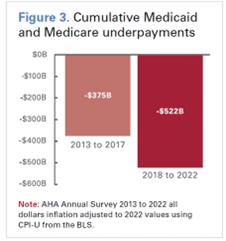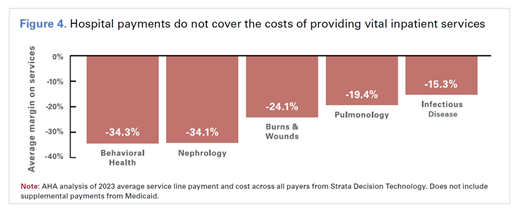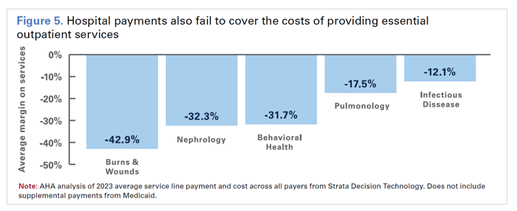Healthcare Systems are Facing Unprecedented Economic Challenges. CBS Can Turn These into Opportunities
A recent study by The American Hospital Association showed that America’s hospitals and health systems are experiencing unique and transformational challenges. They simultaneously face increased demand for acute care services while enduring significant operational and reimbursement challenges.

Critical staffing shortages, supply chain disruptions for drugs and medical supplies, and high inflation rates have driven up hospital costs as they provide around-the-clock patient care. At the same time, hospitals are dealing with insufficient reimbursement increases from government payers and rising administrative burdens due to problematic practices by commercial health insurers.
These combined challenges have created financial uncertainty, leaving many hospitals and health systems operating with greatly reduced profit margins or no profits at all. Although recent data cited in the AHA report indicates a slight stabilization in finances from the historic lows of 2022, the sector is still far from meeting the necessary levels to address care demand, invest in new technologies and interventions, and prepare for future health care crises.
In 2022, the latest year with available data, hospitals admitted nearly 137 million patients to emergency departments and delivered over 3.5 million babies. Many of these critical services are highly resource-intensive and expensive to provide. The situation is further complicated by demographic trends like an aging population and clinical factors such as increased patient acuity. This has led to a steady rise in the proportion of inpatient utilization among more clinically complex patients covered by Medicare and Medicaid. Inpatient services are not only costlier to provide, but public payer payments for these services are significantly below the actual costs.
Some of the alarming developments that the AHA study found include:
- Underpayments from Medicare and Medicaid totaled nearly $130 billion in 2022, and Medicare paid just 82 cents for every dollar hospitals spent caring for patients, which resulted in a shortfall of almost $100 billion.
- Reimbursements for inpatient behavioral health services were 34.3% below costs across all payers on average in 2023, according to data from Strata Decision Technology

- Commercial health insurers have burdened hospitals with time-consuming and labor-intensive practices like automatic claims denials and onerous prior authorization requirements
- A 2021 study by McKinsey estimated that hospitals spent $10 billion annually on dealing with insurer prior authorizations. Furthermore, a 2023 study by Premier found that hospitals are spending just under $20 billion annually appealing denials — more than half which was spent on claims that should have been paid out at the time of submission.
- Costly burn and wound services were 42.9% below costs across all payers.
- Denials issued by commercial MA plans rose sharply by 55.7% in 2023.14 Notably, many of these denials were ultimately overturned.

If your private practice, hospital or healthcare system is being hurt by these developments, then you should consider talking to Coding & Billing Solutions. Our experienced management team and fully domestic coding staff have been helping our clients navigate these difficult challenges through reduced denials and improved coding outcomes.
Contact us today to talk about how CBS can help.

